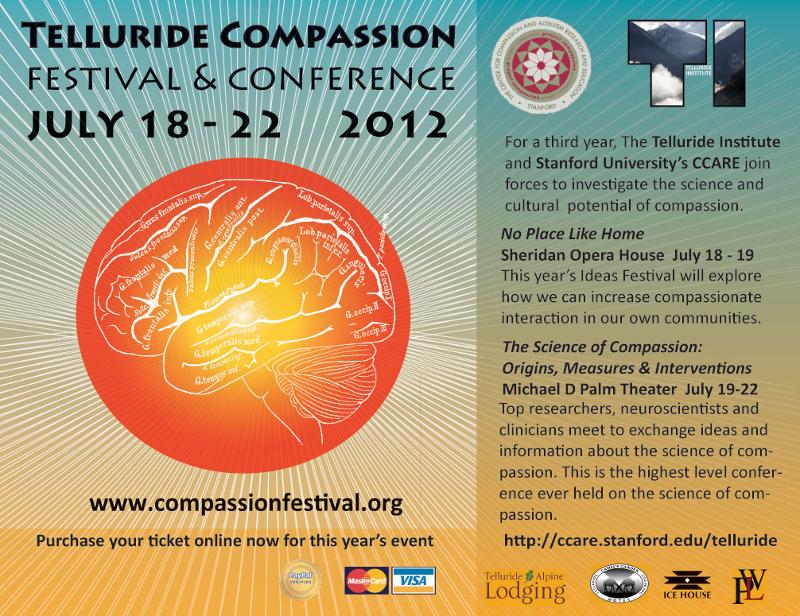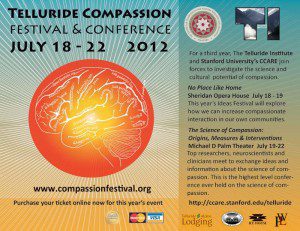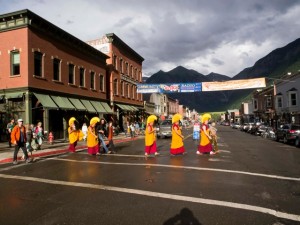
04 Jul DR. DOTY LEADS TELLURIDE EVENT
Telluride Compassion Festival welcomes Dr. James Doty
Dan Buettner was one of the many charismatic presenters at Mountainfilm in Telluride 2012. Buettner spoke twice at the event based on findings summed up in his two books: “The Blue Zone: Lessons for Living Longer from the People Who’ve Lived the Longest” and “Thrive: Finding Happiness in the Blues Zones Way.”
As far as longevity goes, Buettner says it’s “20 percent genes and 80 percent lifestyle.” Folks in Loma Linda, California; Sardinia, Italy; Nicoya, Costa Rica; Ikaria, Greece; and Okinawa, Japan, places old people thrive, are all living in environments that encourage constant and consistent natural movement like walking (no gonzo exercise). People living in these places have the right outlook on life: they live for now (not tomorrow and not to work) and know how to downshift. They eat wisely, which means a plant-based diet supplemented by meat – about three ounces, about five times a month – washed down with a glass (or two) of wine. Most important, they value family (and families value their seniors), and share lots of face time with loved ones and close friends. Connection seems to be a sine qua non of longevity.
Pretty much the same holds true for happiness: interconnectedness is key. It’s all about survival of the kindest.
Buettner’s findings would be a giant DUH! to Dr. James R. Doty, who, along with his colleagues, is out to change the world one empathetic act at a time.
Dr. Doty Professor of Neurosurgery at Stanford University School of Medicine and Founder/Director of the Center for Compassion and Altruism Research and Education, (CCARE), of which His Holiness the Dalai Lama is the founding benefactor. In that capacity, Dr. Doty collaborates with scientists across disciplines, examining the neural bases for compassion and altruism. In a recent blog in the Huffington Post (6/7/2012), Doty said this:
“Our poverty in the West is not that of the wallet but rather that of social connectedness. In this modern world where oftentimes both parents work, we are spending less time as a family. People are living farther away from extended families and perhaps more disconnected than ever before as suggested by Robert Putnam in “Bowling Alone.” Putman observes that we thrive under conditions of social connection but that trust and levels of community engagement are on the decline. Loneliness is on the rise and is one of the leading reasons people seek counseling… One large-scale study showed that lack of social connectedness predicts vulnerability to disease and death above and beyond traditional risk factors such as smoking, blood pressure, obesity and lack of physical activity. While many pay attention to their diet and go to the gym regularly to improve their health, they don’t think of social connectedness this way. Just like physical fitness, compassion can be cultivated and maintained.”
Welcome to the 3rd annual Telluride Compassion Festival (Wednesday, July 18, to explore how we can increase compassionate interaction in regional communities) and Conference, Thursday, July 19 – Sunday, July 22, Michael D. Palm Theatre, the first large-scale international conference of its kind dedicated to scientific inquiry into compassion. The momentous event is brought to town by the Telluride Institute in partnership with Stanford’s CCARE. About 30 experts – doctors, scientists, meditation practitioners, contemplatives of various faiths, educators – will assemble in Telluride to share the results of exhaustive research on the subjects of compassion, altruism and meditation.
For a preview of the good news in store, Yoga Journal, (August), says this in a cover story on compassion:
“Lately scientists have become fascinated by this inborn human ability to feel for one another and for good reason: Whether you’re on the giving or the receiving end, compassion has been shown to have profound and measurable effects, from reduced levels of stress and depression to faster healing from surgery.”
What exactly is compassion?
“Compassion is the recognition of another’s suffering and a desire to alleviate that suffering. Often brushed off as a hippy dippy religious term irrelevant in modern society, rigorous empirical data supports the view of all major world religions: compassion is good,” said Doty (in the Huffington Post).
Bottom line: Compassion (and related disciplines) is as essential for the well-being of humans as good food and good sex. And acts of compassion similarly reduce blood pressure and stress while improving overall health.
Helping others helps ourselves? Sounds like a total win-win, the physio-emotional equivalent of dark chocolate.
Doty also used the Huffington Post blog to announce the Telluride conference.
“I’m happy to report that in July, CCARE will be sponsoring the largest gathering of experts ever brought together on this topic in a conference entitled, Science of Compassion: Origins, Measures and Interventions. Many of the pioneering researchers of compassion, including several mentioned in this article, will be presenting their latest research findings there. We invite you to join us.”
A festival pass is just $75. A conference pass is $175. A combined ticket is $225. All tickets are available at compassionfestival.org or at the CCARE site http://ccare.stanford.edu/telluride. You can also sign up as a volunteer by e-mailing to <compassionfestival@gmail.com>
To whet your appetite even more, click the “play” button and listen in on my conversation with Dr. James Doty.




Sorry, the comment form is closed at this time.